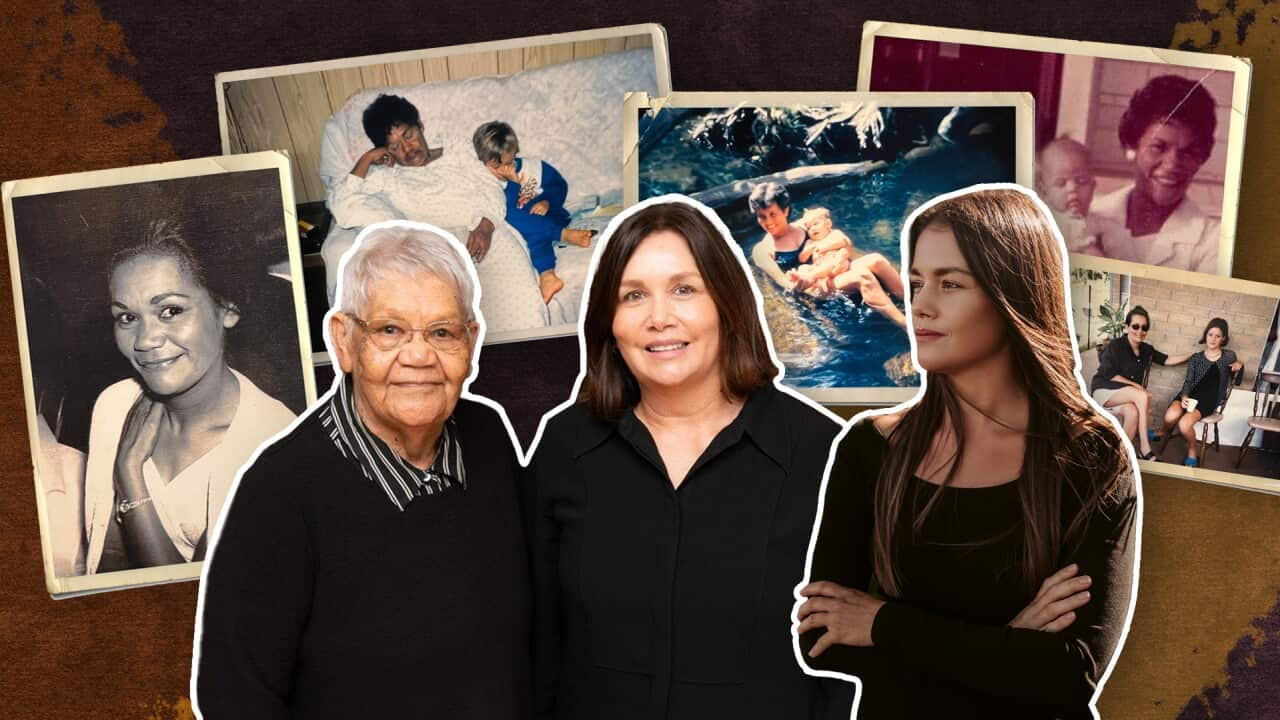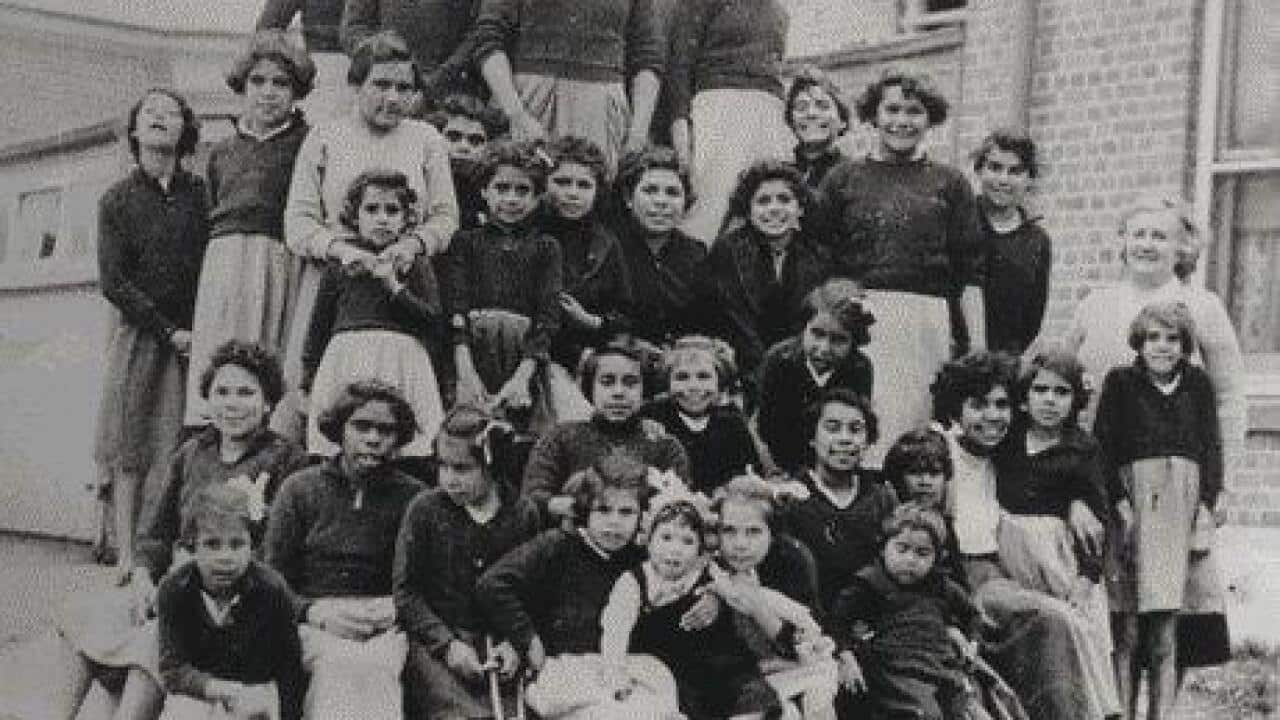

7 min read
This article is more than 1 year old
Feature
Aunty Lorraine was stolen. Her journey home inspired three generations of strong women dedicated to healing
Returning to Coota Girls Home triggered something in Aunty Lorraine and she began her journey to find out about who she really was.
Published 7 March 2024 1:41pm
Updated 7 March 2024 1:59pm
By Rachael Knowles
Source: NITV
Image: Aunty Lorraine Peeters, Shaan Peeters and Meagan Gerrard are three generations of strong, proud Aboriginal women. (Supplied / The Peeters Family)
When Meagan Gerrard was a child, she spent her days playing barefoot on a farm on Ngadjon-Jii Country.
In the evening, she would curl up to watch a movie beside her Grandmother, Aunty Lorraine Peeters, who would take Meagan's feet and rub them.
It was years before Meagan would understand the significance of this act of love.
"I look back now and think how wonderful that was," she said.
"As a child herself growing up in an institution, she wasn't shown tender care yet she was able to provide that to us."
Aunty Lorraine is a survivor of the Cootamundra Domestic Training Home for Aboriginal Girls.
She was stolen from Brewarrina Mission in north-west New South Wales in 1942.
She was one of eight siblings. Her brothers were taken to Kinchela Aboriginal Boys Home, and she and her sisters to Cootamundra Domestic Training Home for Aboriginal Girls.

Aunty Lorraine Peeters at the Cootamundra Girls Home. Source: Supplied / The Peeters Family
"I was taught a culture that wasn't my own," Aunty Lorraine told NITV.
I came out of there thinking I was a different person . . . I was brainwashed to believe I was someone else.
Despite this, Aunty Lorraine's daughter says she always instilled a strong sense of Aboriginal identity in her and her siblings.
"I recall at a very young age Mum taking us to Corroboree at Bagot Reserve in Darwin. This sticks in my mind," Shaan Peeters said.
"She may not have begun her journey but deep down she had that strong connection to who she should have been."

Aunty Lorraine Peeters holding baby Shaan Peeters in Darwin. Source: Supplied / The Peeters Family
Learning about Cootamundra
Shaan grew up hearing stories of Coota Girls Home from other survivors. However, it wasn't until Aunty Lorraine returned to the institution in the early 1990s Shaan heard her mother's story.
"I was there when Mum first returned to the institution," she said.
"Knowing the story is important. Knowing the truth is important."
She said knowing the story, made her family more "grounded, strong, resilient and proud".
READ MORE

Explainer: the Stolen Generations
Meagan first learnt of her Grandma's story on their arrival home.
"I recall the day vividly. I was eight years old. We were all sitting around the dining room table in our Newcastle home on Awabakal Country," she said.
"I recall the tears and the sobbing; this was unusual for us to witness. She was being held and comforted by my mother and cousin. I asked what had happened and that was the day I first learnt about my family’s history and the atrocities our people faced – the babies, the children, the parents, the families, and whole communities."
The beginning of a three-year healing journey
Returning to the institution triggered something in Aunty Lorraine, and began her healing journey.
The strong Wailwan/Gamilaraay woman travelled with her children not only to the institution but back to her birthplace and ancestral home, Warren, in northwest NSW.
"It took three very long years to reclaim my identity as an Aboriginal person," said Aunty Lorraine.
"It helped doing it together. It healed us all. Taking those footsteps, getting back to Country and home.
"We did that whole journey together, it was a full circle moment and they found their true identity too."
With the healing, came a deeper understanding of the impact of institutional abuse, trauma and inter-generational trauma.
"The inter-generational trauma I think impacts us differently," said Shaan.
"Mum always dressed me up and made sure I always looked clean and we kept up appearances, but this kept us safe.
"I think with my kids, I let some of that go but I did not let them out of my sight for a moment until they were older. I tried not to hold on too tight, but always wanted to be there for them."

Shaan Peeters with a young Meagan. Source: Supplied / The Peeters Family
The influence of our mothers
Aunty Lorraine and Shaan have a special bond. From her earliest years, Shaan idolised her Mum.
"Even though Mum didn't have anyone to tell her or show her how to parent, she did a damn good job with what she had. She inspired me to become a mother," she said.
"I had a real drive to get a university education because it was something my mother didn't have the opportunity to do. I was a solo parent, I had a full-time job and I also studied at uni for three years.
"It was hard but through it all, I thought of my kids and if I succeeded it would give them a better life."

Shaan Peeters with baby Meagan. Source: Supplied / The Peeters Family
"My grandchildren have known the story of Mum since they were old enough to understand. Meagan ensures that they understand this deeply through the work that she does," Shaan said.
"The grandsons will grow up to be very strong people and very strong in their identity."
Aunty Lorraine sees the same in her great-grandchildren.
"They are strong in their identity, their spirituality and knowing their Country," she said.
"Everything I lost, they have everything back. It makes them stronger and lets them move forward in their lives.
"I'm so proud of both Meagan and Shaan for carrying that knowledge and passing it down to their babies and children."

Aunty Lorraine Peeters asleep on the couch beside her grandchild. Source: Supplied / The Peeters Family
Giving back and empowering healing and progress
The women have facilitated healing and truth-telling beyond their family.
All three have been involved with the Coota Girls Aboriginal Corporation, with Meagan working for the organisation full-time.
Meagan sees the work as her "responsibility"
"If we as a people do not get in and do the work, all will be lost," she said.
"We have a responsibility to reconnect with, to revitalise, and to maintain our culture. We have a responsibility to each other as First Nations people, to not leave one another behind and to acknowledge that we are all at different stages of our healing journey."
There's never a day that Meagan isn't in awe.
"I am honoured to be able to work with Stolen Generations Survivors and families every day – their life experiences are unfathomable, but their resilience is palpable," she said.
"It has made me grow in ways I couldn’t have imagined. To be able to apply my skills and creativity to my work, and to do this with an amazing group of women, all in honour of my Aunties is everything to me."
She credits her Mum and Grandma for her passion.
"Professionally in their careers as truth-tellers and educators, my mother and grandmother have shown me how you can impact one’s life so greatly simply through sharing, patience and nurturing," she said.
Three generations of their family now work in roles that empower healing in others.
It's through their love of community and truth-telling that the three women have made and are continuing to make progress for their family and their people.
"I have always felt strongly that to see progress for our people, we must not leave anyone behind. And I feel that my grandmother, my mother and I share this belief," said Meagan.
"It is deeply embedded within us. We will not move forward without supporting those who are unable to support themselves or may not have the right support in their lives."






